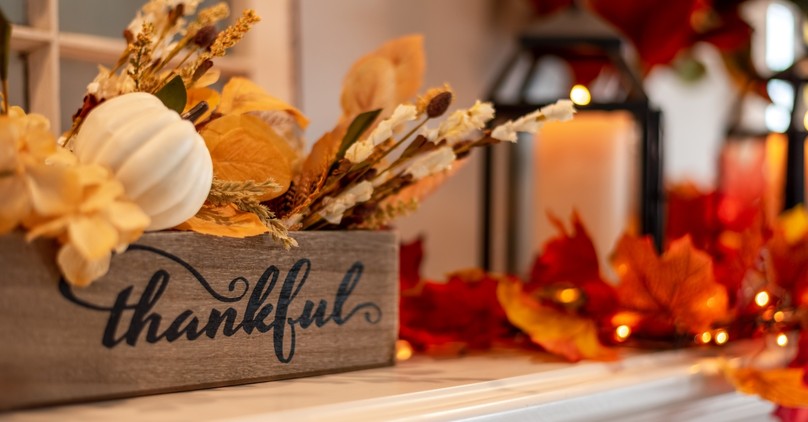
One of the greatest things that we as adults can do is to teach our little ones how to say, “thank you.” These two simple words have a way building a level of respect, both for people and for God.
Just recently, I was with my just-learning-to-speak grandchild at an event where she dropped her toy. Before I could do it, someone reached down, picked up the toy and handed it back to her. I said to my grandchild, “Say thank you,” but she did not respond. Again I said, “Say thank you to the nice person,” once again there was no response. Finally, I told the person thank you on her behalf with a smile. A few days later, at a different location, I overheard my grandchild saying thank you to someone else — without any prompting from me, and there was such a warm feeling that I experienced in knowing that my grandchild had not forgotten, and that she really did know how to say thank you.
If I could have such a response to my grandchild saying thank you, how do you think it makes God feel when we, His people, say thank you? And how He, in turn, must feel when we don’t?
Don’t Allow Ingratitude to Creep In
Ingratitude is a frame of mind and heart that can fly under the radar by us, but will never go unnoticed by God. Listen to these stinging words spoken by God, as He refers to His people:
“You of this generation, consider the word of the LORD: ‘Have I been a desert to Israel or a land of great darkness? Why do my people say, ‘We are free to roam; we will come to you no more’? Does a young woman forget her jewelry, a bride her wedding ornaments? Yet my people have forgotten me, days without number” (Jeremiah 2:31-32).
This unmistakable “do it myself” or “I don’t need your help” attitude epitomizes the ingratitude that can subtly enter in to our walk with the Lord. If we are not careful, our thank yous to the Lord can become common and hollow – a product of what is expected, rather than what is truly heartfelt. We must never allow ingratitude to be named among us because Christians, more than anyone, have so much to be thankful for. Above all the things that we can be thankful for, we are to be most thankful for this great salvation that we have been given, in all of its powerful aspects.
“Blessed be the God and Father of our Lord Jesus Christ, who according to His abundant mercy has begotten us again to a living hope through the resurrection of Jesus Christ from the dead, to an inheritance incorruptible and undefiled and that does not fade away, reserved in heaven for you, who are kept by the power of God through faith for salvation ready to be revealed in the last time” (1 Peter 1:3-5).
Each Thanksgiving, when our family goes around the room and the question is asked, “What are you most thankful for?”, everyone knows my response ahead of time, because it is always, “My salvation.” If you ever find yourself at loss over what you should thank the Lord for, you can start with your salvation.
During this season of thanks, allow Scripture to inspire you toward gratitude; it will also teach you valuable lessons along the way.
1. Jehoshaphat and His Choir
Jehoshaphat was the fourth king of Judah. He was a good king, whose heart was lifted up in the ways of the LORD. In time, as was the case with many of the kings of that time, an invasion of the land was in the works:
“Then some came and told Jehoshaphat, saying, ‘A great multitude is coming against you from beyond the sea, from Syria; and they are in Hazazon Tamar’ (which is En Gedi). And Jehoshaphat feared, and set himself to seek the Lord, and proclaimed a fast throughout all Judah” (2 Chronicles 20:2-3).
Jehoshaphat ends his prayer with one of the most honest and heartfelt petitions in all of Scripture:
“O our God, will You not judge them? For we have no power against this great multitude that is coming against us; nor do we know what to do, but our eyes are upon You” (2 Chronicles 20:12).
As powerful as this is, it is what happens next that catches our attention. As the armies of Jehoshaphat are about to engage in battle, he does something that we don’t see coming — he appoints singers to lead the army into battle, to give thanks to God on the front lines:
“So they rose early in the morning and went out into the Wilderness of Tekoa; and as they went out, Jehoshaphat stood and said, ‘Hear me, O Judah and you inhabitants of Jerusalem: Believe in the Lord your God, and you shall be established; believe His prophets, and you shall prosper.’ And when he had consulted with the people, he appointed those who should sing to the Lord, and who should praise the beauty of holiness, as they went out before the army and were saying: ‘Praise the Lord,
For His mercy endures forever’” (2 Chronicles 20:21-22, emphasis added).
The second use of the word “praise” in this verse is the Hebrew word, yadah, which literally means, “to give thanks.” So, the picture here is this: before the fighters fight, and the warriors war, the praisers need to praise! And while we do not engage in hand to hand combat with the Enemy, we do engage in the fight of faith, and the giving of thanks — by faith — is just what is needed at times to put the Enemy to flight.
“Now when they began to sing and to praise, the Lord set ambushes against the people of Ammon, Moab, and Mount Seir, who had come against Judah; and they were defeated” (2 Chronicles 20:22).
Gratitude by faith, for who He is, what He has done, and also what He is able to do, even as the Enemy is poised to strike can help to carry us on to God’s best for us.
2. The Downcast Psalmist
“As the deer pants for the water brooks, So pants my soul for You, O God. My soul thirsts for God, for the living God. When shall I come and appear before God?” (Psalm 42:1-2).
Have you ever felt this way? Here, the psalmist finds himself in a state of depression. He was away from the people of God and the house of God, which symbolically represented His presence. As you read through this psalm, you can almost feel the psalmist’s despondency as he speaks of his tears being his meat and the poring out of his soul as he remembers how things used to be. If it were not for one thing which he decided to do while in the throes of his despair, I can imagine that he may have been swept away in a flood of disconsolation:
“Why are you cast down, O my soul? And why are you disquieted within me? Hope in God, for I shall yet praise Him for the help of His countenance” (Psalm 42:5).
Once again, we see that this word “praise” is the word in the Hebrew that we spoke of previously. The psalmist here says in essence, I am away from the people and the house of God; I am lonely. But in spite of this, I am going to choose to thank God for who He is and for His presence that is with me nonetheless.
In these seasons of thanks, millions of people are lonely due to the loss of loved ones and other extenuating circumstances. For those who do not know the Lord, many choose to drown their sorrows or worse. For those who do know the Lord, the very thing that it seems makes no sense at all to do in the natural, is the very thing that must be done at all costs. We should keep in mind that this life we live in Christ is not a natural life — it is supernatural — and we are called to do the supernatural.
When the Enemy presses in and relates to you that you are no one, you have no one, and no one even cares, those lies should be all the incentive you need to spur you on to give thanks to the Lord. Some will say, “You just don’t know.” This is true; no one knows what you are facing — but God does. And though you may have to do it through gritted teeth and through bitter tears burning your eyes, you will find that giving thanks to the Lord for who He is, in the darkest of circumstances, will drive the gloom away.
“In everything give thanks; for this is the will of God in Christ Jesus for you” (1 Thessalonians 5:18).
3. The Ten Lepers
The story of the ten lepers is a shining example of the ingratitude that we spoke of earlier, but also shows us the necessity of giving thanks. As the ten lepers lifted up their voices asking for mercy from Jesus, He tells them to go and show themselves to the priest. Their obedience to that command resulted in their healing, because Scripture states that as they went, they were cleansed. But then we read:
“And one of them, when he saw that he was healed, turned back, and with a loud voice glorified God, and fell down on his face at his feet, giving him thanks: and he was a Samaritan. And Jesus answering said, ‘Were there not ten cleansed? But where are the nine? There are not found that returned to give glory to God, save this stranger’” (Luke 17:15-18).
When he saw that he was healed, he turned back. If you haven’t said thank you to the Lord today, or recently, do it now — go back and say thank you. Sometimes gratitude can be difficult thing for some, but when we recognize the magnitude of grace and mercy that the Lord has bestowed upon us, our hearts cry out with the psalmist:
“Praise the LORD, my soul; all my inmost being, praise his holy name. Praise the LORD, my soul, and forget not all his benefits — who forgives all your sins and heals all your diseases, who redeems your life from the pit and crowns you with love and compassion, who satisfies your desires with good things so that your youth is renewed like the eagle’s” (Psalm 103:1-5).
And yes, this word “praise” in Hebrew also means “thanks.” Let’s not be like the nine; let’s be like that one who returned. There is great blessing in acknowledging the goodness of God.
Photo credit: ©Getty Images/Kristen Prahl









